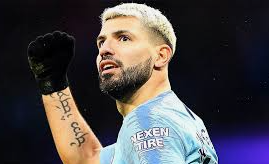“I swear you will never see anything like this again!” Those words, spoken with deep passion over and transmitted round the world ten years ago by a football commentator, will be familiar to some readers; indeed, for many, the words will be deeply embedded in their psyche for the rest of their lives. Nothing like that had happened before and it is extremely unlikely that we will see it again.
It may well be true to add that we will never hear anything like that again. After all, it was just one word that was used to describe the moment – one word that went on and on and on. That one word, as some readers will recall only too vividly, was, “Aguerooooooo”. It was the moment on 13th May 2012 in the fourth minute of injury time when Manchester City scored the winning goal, having been 1-2 down at the end of normal time, to gain their first League title for over forty years, all the sweeter for them as they gained the title on goal difference from their fiercest rivals, Manchester United. For anyone reading this who remains in the dark, Sergio Aguero was the Manchester City striker who scored that decisive goal. The commentator certainly was caught up in the excitement and significance of the moment and lived out the moment for all who were watching.
Of course, that one word, “Aguerooooooo”, in effect could be expanded to the more familiar and common exclamation heard in the football commentaries around the world, “It’s a gooooooooooal!” The cold fact is the simple one that a goal has been scored, a goal has been achieved; the goal is, after all, to score a goal. And as sport mirrors life (or is it the other way round?) so our youngsters, we are told, need to aim for a goal. Long may a parent wait to hear the words said of her child, “It’s a goal!” What then should these goals be? The elongated version of the commentator’s exclamation will give us the clue (or should we write that as “give us a cluuuuuuuueeee”?)
The goal for our children should be to go-all. The first part of that highlights the need to go. Nothing will come by waiting, by standing or sitting still; they must actively go and do something to achieve it. They are to go, not come, as ‘come’ implies things must come here but the goal will be achieved by going somewhere else. Furthermore, it is not saying the goal is to win but rather to go. The goal is about moving, about progress, about development; that is what should be celebrated with intensity and excitement. If children are to reach their ‘goooooal’, they must first go.
What we may fail to realise, understand or even accept is that the goal is scored when we add ‘all’ to the word (and action) ‘go’; “go, all” is the cry! Real value is when all go and not just some go. In sporting terms this is obviously vital if we are to achieve our goal; each player, all players in the team, must go together. They must all go in the same direction, in the same manner, at the same time, not leaving any behind. When all go, then the goal will be achieved.
It is interesting that the internet reveals a number of projects or organisations using the name ‘It’s A Goal’. One such project in the UK (IAG), we read, was “established to address the problems of depression and potential suicide among younger men aged 16–35”. Another project, promoted by an organisation called Unlimited Potential, under the same title, ‘It’s A Goal!’ states that its aims are “to reduce social isolation and increase social inclusion, increase positive mental health and well-being, increase employability”. Both these projects are concerned that all people will go. As the oft African proverb rightly reminds us, “If you want to go far, go together”; ubuntu.
Here is an important lesson for sports coaches to present to our children. For the team to achieve their goal they must all go together; it is not “go solo” but “go all”. However, coaches must also remember that all of those who do not make the team are still also meant to go; coaches have a responsibility for all pupils at school to move forward, to progress and develop, even if they do not make it into a team. Linked to that, it may also be worth remembering or even reflecting and later reasoning that a ‘goal for’ is also a ‘goal against’. As a team scores a goal, another one concedes a goal, so as a youngster achieves her goal, it comes at the expense of another one who has lost her goal. It is very simple; our goal as coaches and parents, just like the youngsters’ goal is to “go all”. Will we ever see or hear anything like that happen? I-don’t-knooooooow!




